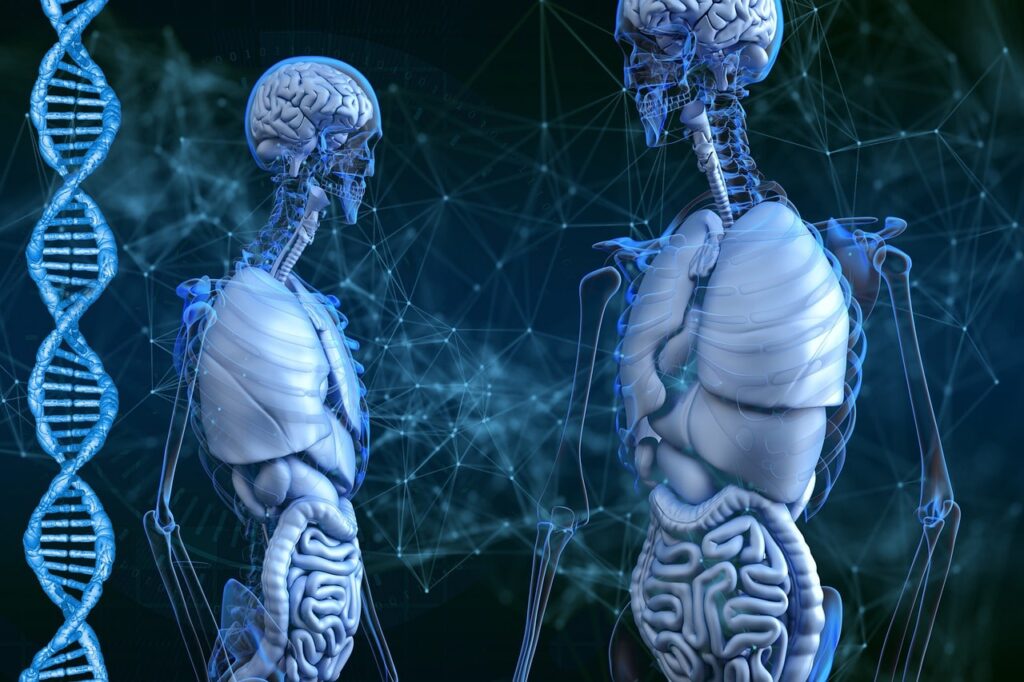Keep Your Bones Healthy: Tips for Strong Skeletal System
The foundation of our body’s structure lies in the intricate network of bones, a vital framework supporting movement and protecting essential organs. The significance of bone health extends beyond mere structure; it influences overall well-being. Joints, vitamins, and minerals are pivotal in this intricate system. In this article, we delve into the essential elements contributing to strong and resilient bones health, exploring how lifestyle choices and nutritional considerations play key roles in maintaining optimal skeletal health.

- Introduction
- Understanding the Skeletal System
- Essential Nutrients for Bone Health
- The Gut-Bone Connection
- Securing Your Skeletal System with Advance Nutrients
- The Power of Collagen
- Preventing Fractures and Joint Pain
- Best Drinks for Bone Health
- Muscle Health and Bone Support
- Osteoporosis: A Concern for Bone Health
- Yoga and Walk for Strong Bones
- Being Physically Active: A Boon for Your Bones
- Maximizing Nutrient Absorption
- Unveiling the Effects of Nutrition on Bone Health
- Conclusion
1-Introduction
The human skeletal system is a marvel of engineering, serving as the structural foundation for the body. Beyond providing support, our bones play a crucial role in protecting vital organs and facilitating movement. In this article, we’ll explore key elements such as joints, vitamins, and minerals, emphasizing their significance in maintaining optimal bone health.
2-Understanding the Skeletal System
The skeletal system is a complex network of bones, joints, cartilage, and ligaments, working together to maintain the body’s form and function. Bones are dynamic tissues that undergo constant remodeling, ensuring their strength and flexibility. Understanding the intricate details of bone structure and composition provides insights into how to support their health effectively.
3-Essential Nutrients for Bone Health
Calcium: The Building Block
Calcium is the primary building block of bones, contributing to their formation and maintenance. It not only provides structural support but also plays a crucial role in various physiological processes. Dairy products, leafy greens, and fortified foods are excellent sources of calcium, and ensuring an adequate daily intake is essential for bone health.
Vitamin D: Facilitating Calcium Absorption
Vitamin D acts as a facilitator, enabling the body to absorb and utilize calcium efficiently. Sunlight exposure triggers the synthesis of vitamin D in the skin, and dietary sources like fatty fish and fortified cereals contribute to overall intake. Maintaining optimal levels of vitamin D is vital for ensuring the effectiveness of calcium in supporting bone health.
Magnesium: Supporting Bone Density
Often overshadowed by calcium and vitamin D, magnesium is a silent hero in maintaining bone density. This mineral is involved in the conversion of vitamin D into its active form, enhancing calcium absorption. Nuts, seeds, whole grains, and leafy greens are excellent dietary sources of magnesium, and incorporating them into your diet supports overall bone health.
4-The Gut-Bone Connection
The health of your gut is intricately linked to the well-being of your bones. A flourishing gut microbiome, fostered by the consumption of probiotics and prebiotics, creates an environment conducive to nutrient absorption. Including foods like yogurt, sauerkraut, and fiber-rich vegetables in your diet supports both a healthy gut and strong bones.
5-Securing Your Skeletal System with Advance Nutrients
While calcium and vitamin D take the spotlight, other advanced nutrients play crucial roles in maintaining optimal bone health. Vitamin K aids in bone mineralization, ensuring calcium is deposited where it’s needed. Potassium and phosphorus regulate bone density and support overall skeletal integrity. A diverse and well-balanced diet incorporating foods like leafy greens, bananas, and fish covers these advanced nutrient needs.
6-The Power of Collagen
Collagen, a protein abundant in our bodies, is a major component of bones. It provides strength, flexibility, and resilience to the skeletal structure. There are various types of collagens, each serving specific functions in different tissues, including bones. Incorporating collagen-rich foods such as bone broth, fish, and collagen supplements contributes to the maintenance and improvement of bone health.
7-Preventing Fractures and Joint Pain
A proactive approach is crucial for preventing fractures and alleviating joint pain. Maintaining a healthy body weight reduces stress on the joints, decreasing the risk of fractures. Incorporating strength training exercises, which enhance muscle support around the bones, further fortifies the skeletal system. Consistent physical activity, tailored to individual capabilities, is key to long-term bone health.
8-Best Drinks for Bone Health
Hydration is often underestimated in its impact on bone health. Water, a fundamental component of the body, plays a crucial role in maintaining the balance of minerals in the bones. Additionally, opting for drinks fortified with calcium, such as milk or plant-based alternatives, provides a double benefit—hydration and bone support.
9-Muscle Health and Bone Support
Recognizing the symbiotic relationship between muscles and bones is paramount. Engaging in regular strength training exercises not only builds and maintains muscle mass but also directly benefits bone health. Weight-bearing exercises, such as lifting weights or doing resistance exercises, stimulate bone growth and help prevent bone loss over time.
10-Osteoporosis: A Concern for Bone Health
Osteoporosis, characterized by weakened and porous bones, is a significant concern for bone health, particularly in older adults. Understanding risk factors, such as age, gender, and hormonal changes, is crucial. Implementing preventive measures early on, including a bone-healthy diet, regular exercise, and, if necessary, medication, can help manage and reduce the risk of osteoporosis.
11-Yoga and Walk for Strong Bones
Incorporating yoga and walking into your routine can significantly contribute to bone health. Yoga, with its emphasis on balance, flexibility, and weight-bearing poses, strengthens bones and improves overall body awareness. Additionally, regular walking, a low-impact exercise, promotes joint flexibility and supports bone density.
12-Being Physically Active: A Boon for Your Bones
An active lifestyle offers myriad benefits for bones. Whether it’s dancing, hiking, or engaging in recreational sports, physical activity supports bone health by enhancing bone density and strength. Creating a personalized fitness plan that includes a mix of cardiovascular exercises, strength training, and flexibility exercises ensures comprehensive skeletal support.
13-Maximizing Nutrient Absorption
Optimizing nutrient absorption is as crucial as ensuring an adequate nutrient intake. A well-functioning digestive system, supported by a diet rich in fiber and probiotics, enhances the absorption of essential nutrients. Including fermented foods, whole grains, and a variety of fruits and vegetables in your diet promotes gut health and maximizes nutrient utilization.
14-Unveiling the Effects of Nutrition on Bone Health
Our nutritional choices have profound effects on bone health in the long run. A balanced diet not only prevents nutrient deficiencies but also safeguards against bone-related issues in the future. Adequate intake of essential nutrients, coupled with a healthy lifestyle, contributes to strong and resilient bones, ensuring they stand the test of time.
15-Conclusion
In conclusion, maintaining a strong skeletal system involves a holistic approach that encompasses various aspects of our lifestyle. From ensuring an adequate intake of essential nutrients to adopting a physically active routine, every decision plays a role in shaping the health of your bones. Embrace a bone-friendly lifestyle, incorporating a balanced diet, regular exercise, and mindfulness about overall well-being.



